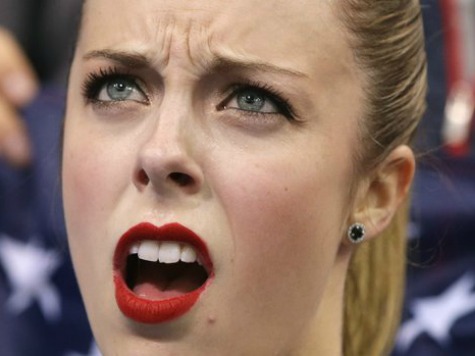Americans worried over what disasters awaited in Sochi. Terrorism? Dingy hotels? Rabid dogs? They didn’t anticipate the disaster would be their Olympic team.
U.S. snowboarder Sage Kotsenburg won the first gold medal of the Sochi games. Since then, to borrow an analogy that Bode Miller surely understands, it’s been all downhill.
The four U.S. Olympians who have stood atop the podium put the entire national team in fifth place, alongside the Russians, Canadians, and Polish, in gold medals. The sixteen combined golds, silvers, and bronzes put the U.S. in a better spot, tied for second alongside Russia and behind the Netherlands, in the total medal count.
Switzerland, a country that we have thirty-nine times more people than, possesses one more gold medal. They make better watches and chocolate, too, but who’s boasting? It’s the Olympics, an international pissing contest in which bragging is obligatory. And Americans don’t have much to boast about on day seventeen of Sochi.
It’s not just that Americans hold fewer medals than the Dutch or than in their dreams. The gold medals we possess don’t possess much luster. Slopestyle? Most people probably think it’s a fashion line. Americans won three golds in this event that didn’t exist in the last Olympics. At least the half-pipe, the site of the other U.S. gold-medal-winning performance, dates all the way back to Nagano.
The golds we do have speak more to our impoverished performance than the golds we don’t have. Nevertheless, medals in old-line Olympic events such as bobsledding, Nordic skiing, and speed skating have proven elusive. Sure, the Winter X-Games are a blast. Its colorful competitors have breathed new life into the Olympics. But a sport whose athletes consider pot a performance enhancing drug isn’t exactly anyone’s idea of what the Greeks had in mind when they dreamt all this up.
It’s not just that we’re losing. It’s how we’re losing.
- Snowboarder celebrity Shaun White, a favorite heading to Sochi, heads back to his California $4 million beach manse without any new hardware. White didn’t win, place, or show defending his gold medal on the halfpipe. He didn’t even bother showing up in slopestyle. “To take an American spot away from another one of the guys,” Canadian snowboarder Max Parrot observed, “some American is probably today, probably sitting at home angry.” A tomato can’t fly if it refuses to get off the ground.
- Figure skater Jeremy Abbott’s high hopes came crashing down when he came crashing down on the ice. His performance for the media wasn’t nearly as graceful as his performance on the ice. “I just want to put my middle finger in the air and say a big ‘F-you’ to everyone who has ever said that to me because they’ve never stood in my shoes,” Abbott emoted in reaction to potential criticism of his twelfth-place finish. “They’ve never had to do what I’ve had to do.”
- U.S. speed skaters hoped to match their eight-medal-winning performance at the Salt Lake City games. Instead, no team member has finished better than seventh. Some blame the drag of their “Mach 39” suits. Others blame Sochi’s low altitude. They have lots of excuses but no medals.
And, unless, like Al Michaels, you believe in miracles, the underachieving won’t change. The men’s hockey team could erase the defeats and disappointments in a few hours’ time on Sunday. But other than a repeat of 1980 thirty-four years and five-thousand-miles away, prospects for salvaging Sochi appear bleak. The International Olympic Committee has awarded most of its medals. Just forty-two of the ninety-eight total events remain up for grabs. Despite more events than ever before, Americans appear on track to finish first fewer than in recent games.
Americans have sway within the IOC. Maybe we could lobby its members to begin awarding nickel, tin, and aluminum medals, too, or perhaps convince them to establish a few more snowboarding events. Certainly that represents our best hope of besting the Norwegian frozen-stiff-competition in the medal count.
“We probably expected more,” Patrick Rimi, director of the U.S. ski team, reflected on the empty necks displayed by most of his athletes. Viewers back home did, too.

COMMENTS
Please let us know if you're having issues with commenting.